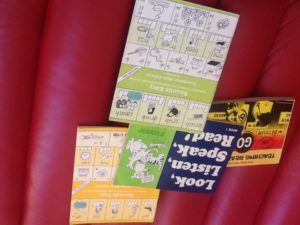
It was with great sadness that I read there will be more compulsory testing in our schools.
Now it is the six year olds who’ve been targeted for testing in literacy and numeracy.
From my years of experience as a teacher I believe good teachers will know which kids in their class need extra help without laborious testing and the pressure this will put on an already overcrowded curriculum and already overworked teachers is enormous.
Not to mention the exam anxiety this might create in young children.
The day before this news came out, I’d read in the paper that countries, like Finland, whose students are excelling in literacy and numeracy don’t start children at school until seven and have no compulsory testing.
They don’t even place a lot of emphasis on homework.
They do, however place an emphasis on reading for pleasure.
So it looks like this program is being fast tracked into our schools just as the old open-plan classrooms were rushed through when they’d already been shown to be failing in the US and Canada when I was a girl.
The new tests will be embraced like the invented spelling and immersion method of language learning which has left us with a falling literacy rate and a generation of fairly average spellers.
For most good early childhood teachers phonics has never left the classroom.
It has been a part of good practice for generations. Why, some of the younger infant teachers know more about it than me who was actually taught in this way.
As a teacher, I’ve learnt some new and wonderful methods of teaching phonics from young teachers the same age as my sons.
I was one of the first generations to be taught the immersion method of language at teacher’s college.
I was also there for the introduction of the new Queensland Writing program where we as teachers had to learn how to write this way in order to pass it on to our students.
 Yet even with this background I have always taught phonics along with discussions about words based on big books, predictive methods like cloze activities, wordgames and instilling in my students a genuine love of reading and writing.
Yet even with this background I have always taught phonics along with discussions about words based on big books, predictive methods like cloze activities, wordgames and instilling in my students a genuine love of reading and writing.
There is no one size fits all method for every student. It is a process.
I was lucky enough to learn my craft at a school where you were not thrown in at the deep end as a graduate teacher but mentored by an experienced teacher, whose methods included a phonics approach and encouragement to use the morning session as a masterclass for your little ones in literacy or numeracy.
We even had our own little mobile library set up where children could choose a book of interest, even if it was a bit hard, to extend themselves.
We ran this in conjunction with their normal take-home readers.
For this ‘fast-track- plan to go ahead there needs to be resources made available to classroom teachers so they can test young children one on one.
One of my last jobs as a teacher involved filling in a couple of mornings a week in a prep class so that the teachers were freed up for testing individually. It took the pressure off everybody.
I had some delightful mornings with a bunch of eager, bright eyed learners and the teachers could concentrate on each individual in a non-threatening way.
Testing also needs to be done in the morning when young children are fresh and focused.
I hope parents too will evaluate testing not as a pass or fail but as a tool for early intervention which will make their child’s literacy and numeracy better in the long run.
Some of the most capable students I know were slow burners who had to work hard at reading, writing and numeracy to reap rewards.
It looks like with all things in education, teachers will just need to find a way.
Hopefully, with supportive administrators, staff, parents and sympathetic governments, things will change for the better in regards to our world rankings in literacy and numeracy.
For me it now looks like it’s time to dust off those old phonics books sitting on a shelf in my library. Perhaps I can try my hand at writing phonics textbooks next. Sounds like they’ll be needed.
Michelle Beesley is a Brisbane born and bred former primary school teacher. A wife, proud grandma and mother of three grown sons, Michelle is thrilled to have recently published her debut contemporary romance novel, It Happened in Paris, with Serenade Publishing. Her novella – Escape to D’ Amour was published in 2019. Michelle’s work can be found in the anthologies – Destination Romance and Short & Sweet. When not reading or writing Michelle can be found at a coffee shop chatting with friends, front row at a fashion show, or beside a rugby union field cheering on her favourite teams.
Michelle is a reluctant traveller, Francophile, keen walker and avid yoga enthusiast plus a book, film and theatre lover who loves everything pink and sparkly (including champagne). You can find Michelle on instagram @michellebeesley_writer and her website: michellebeesley.com.


Leave a Reply